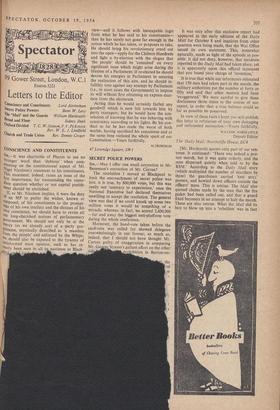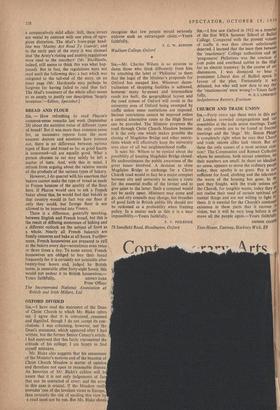It was only after this exclusive report had appeared in
the early editions of the Daily Mail for October 8 and inquiries from other quarters were being made, that the War Office issued its own statement. This, somewhat naturally, made as light of the episode as pos- sible. It did not deny, however, that incidents reported in the Daily Mail had taken place, yet it is apparently upon this official statement that you based your charge of 'invention.'
It is true that while our informants estimated that 150 men had taken part in the march, the military authorities put the number at forty or fifty and said that other matters had been 'exaggerated.' We were careful to give these disclaimers three times in the course of our report, in order that a true balance could as far as possible be preserved.
In view of these facts I hope you will phblish this letter in refutation of your own damaging and unfounded accusation.—Yours faithfully, wi; LIAM HARDCASTLE Deputy Editor The 'Daily Mail,' .Northclifle House, EC4 [Mr. Hardcastle quotes only part of our sen- tence. It continued: 'There was indeed a pro- test march, but it was quite orderly, and the men dispersed quietly when, told to by the RSM.' According to the Daily Mail story (which multiplied the number of marchers by three) the guardsmen carried 'END' BULL' posters, and howled down officers outside the officers' mess. This is untrue. The Mail also quoted claims made by the men that the fire picket had been called out, and that a guard fixed bayonets in an attempt to halt the march. These are also untrue. What the Mail did its best to blow up into a 'rebellion' was in fact a comparatively mild affair. Still, these errors are venial by contrast with one piece of egre- gious distortion. The Mail's front-page head- line was 'Mutiny Act Read To Guards'; and in the early part of the story it was claimed that 'the Army's rioting and inutiny,regulations were read to the marchers' (Mr. Hardcastle. indeed, still seems to think this was what hap- pened). But in fact, the regulations were not read until the following day; a fact which was relegated to the tail-end of the story, on an inner page (Mr. Hardcastle may perhaps be forgiven for having failed to read thus far). The Mail's treatment of the whole affair seems to us amply to justify our description 'largely invention.'—Editor, Spectator.]



































 Previous page
Previous page